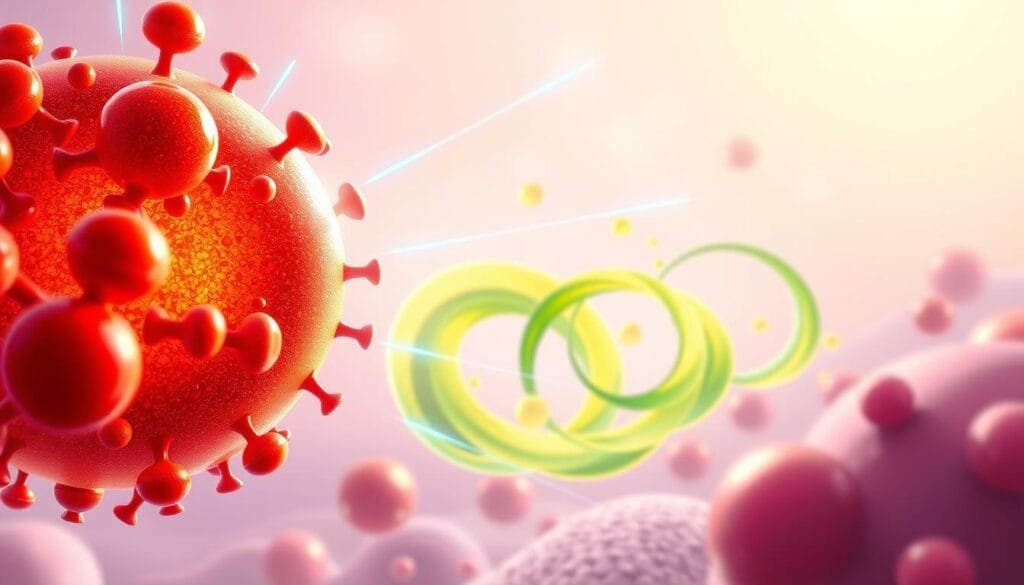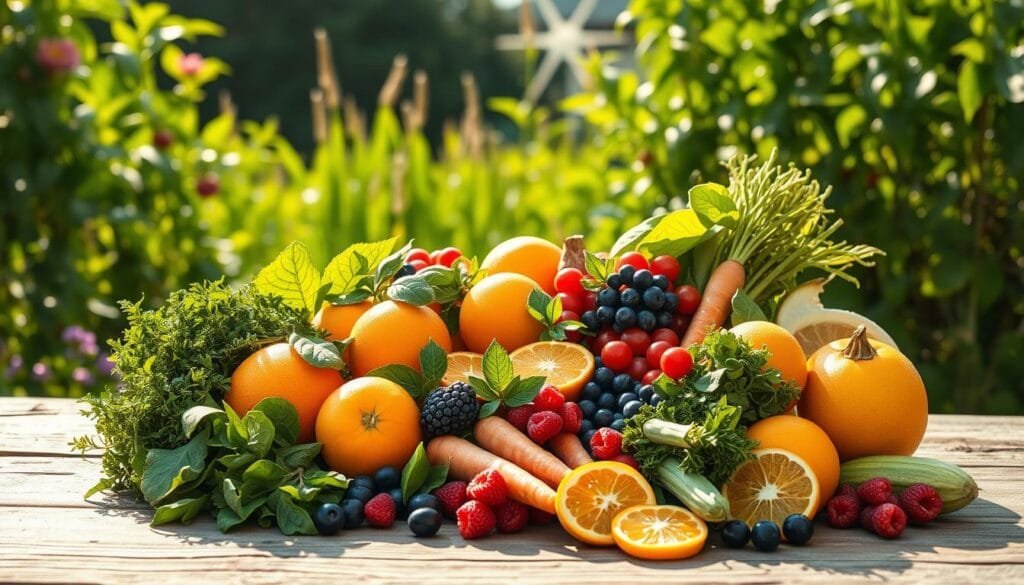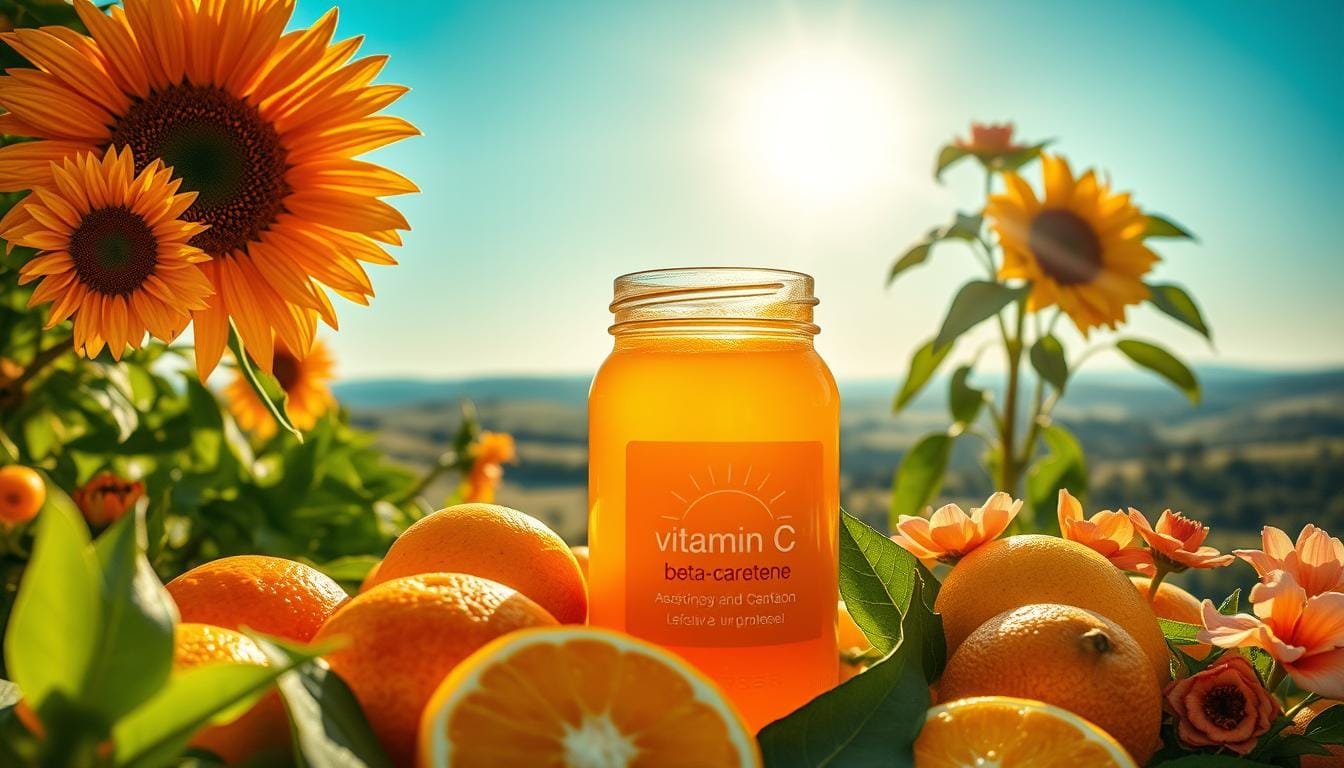Currently Empty: RM0.00
Did you know that some sunscreens contain benzene, a chemical linked to cancer? This alarming fact pushes many to seek safer, natural alternatives. In Malaysia’s tropical climate, sun exposure is unavoidable, making skin care a top priority.
Wellness Concept offers a healthier approach. Their solutions harness powerful antioxidants to defend against harmful rays. Unlike chemical sunscreens, these nutrients support overall health while providing effective protection.
For personalized advice, reach out via WhatsApp at +60123822655. The clinic operates from 9 AM to 6 PM, Monday to Saturday.
Key Takeaways
- Benzene in sunscreens may pose cancer risks.
- Natural alternatives support safer sun defense.
- Malaysia’s climate increases UV exposure.
- Wellness Concept provides tailored solutions.
- Contact +60123822655 for consultations.
Why Natural Sun Protection Matters
Sunlight offers surprising health perks, but its rays also carry hidden dangers. Moderate exposure boosts mood, strengthens immunity, and helps the body produce vitamin D. Yet, too much sun leads to damage skin and premature aging.
UV radiation creates free radicals—unstable molecules that harm cells. Over time, these effects accelerate wrinkles and weaken skin resilience. Chemical sunscreens block rays but may disrupt natural nutrient absorption.
In Malaysia, the UV index averages 11–12, among the highest globally. Daily sun protection isn’t optional; it’s essential. Studies suggest excessive sunscreen use can lower vitamin D levels, creating a tricky balance.
Natural alternatives, like antioxidant-rich diets, offer safer defense. They neutralize free radicals without harsh chemicals. For tropical climates, this approach combines sun safety with overall wellness.
How Vitamin C and Beta-Carotene Shield Your Skin
Oxidative stress from sunlight meets its match in nature’s antioxidants. These compounds neutralize free radicals, unstable molecules that accelerate aging. Unlike synthetic blockers, they work with the body’s natural defenses.

The Science Behind Antioxidants and UV Defense
Beta-carotene, found in orange produce, absorbs harmful rays like a sponge. Studies show it takes 10+ weeks of consistent intake for full photoprotection. Meanwhile, vitamin C repairs collagen and reverses existing damage.
Topical and dietary vitamin C work together. One strengthens skin barriers, while the other boosts internal resilience. This dual action makes it a cornerstone of sun-safe routines.
Why Malaysia’s Climate Demands Extra Care
High humidity here increases oxidative stress. Sweat and moisture strip away natural oils, leaving skin vulnerable. Locally grown mangoes and papayas offer beta-carotene, a tasty defense against these challenges.
| Nutrient | Role in Sun Defense | Local Source |
|---|---|---|
| Beta-carotene | Absorbs UV rays | Mangoes, papayas |
| Vitamin C | Repairs collagen | Guava, calamansi |
Pairing these nutrients with hydration maximizes their effects. It’s a simple yet powerful way to adapt to tropical conditions.
6 Vitamins and Foods That Boost Sun Resistance
Nature provides powerful allies in the fight against sun damage. A balanced diet rich in antioxidants and minerals can enhance your skin’s resilience. These nutrients work from within, offering long-term benefits beyond topical solutions.
1. Vitamin C-Rich Fruits and Vegetables
Guava, a local favorite, packs more vitamin C than oranges. This nutrient repairs collagen and neutralizes free radicals. Calamansi and bell peppers are other easy additions to meals.
2. Beta-Carotene-Packed Superfoods
Sweet potatoes and carrots are abundant in Malaysia. A beta-carotene-rich diet takes 10–12 weeks to build protective effects, per a 2007 meta-analysis.
3. Omega-3 Fatty Acids for Skin Resilience
Salmon and flaxseeds reduce UV-induced inflammation. These essential fatty acids strengthen cell membranes, helping skin retain moisture in humid climates.
4. Selenium and Zinc for Cellular Repair
Sabah’s oysters are zinc powerhouses. Pair them with stir-fried water spinach (high in selenium) for a skin-repairing combo. Garlic boosts absorption, making it a tasty addition.
5. Polyphenol Powerhouses
Wild blueberries and watermelon contain lycopene and polyphenols. These compounds scavenge free radicals, offering extra defense against oxidative stress.
6. Essential Fatty Acids for Inflammation Control
Avocados and nuts provide omega-3s and vitamin E. Together, they soothe redness and support skin barrier function after sun exposure.
| Nutrient | Best Local Sources | Key Benefit |
|---|---|---|
| Vitamin C | Guava, calamansi | Collagen repair |
| Beta-carotene | Sweet potato, papaya | UV absorption |
| Omega-3s | Flaxseeds, mackerel | Reduces inflammation |
For optimal results, combine these fruits and nutrients in daily meals. Consistency is key—studies show benefits accumulate over days and weeks.
Your Daily Sun-Protective Diet Plan
What you eat today can shape how your skin handles the sun tomorrow. Simple tweaks to your nutrition add layers of defense against oxidative stress. Start with meals packed with antioxidants and healthy fats.

Breakfast: Roti jala with carrot sambal kicks off the day. Carrots deliver beta-carotene, while coconut milk in the crepe offers moisturizing fats. Pair it with a Super Summer Sunblock Smoothie—blend blueberries, watermelon, and chilled green tea for a polyphenol boost.
Mid-Morning Snack: Papaya and pomelo salad balances sweetness and tang. These tropical fruits are rich in lycopene and vitamin C, which combat free radicals. Sprinkle with lime juice to enhance absorption.
Lunch: Grilled mackerel with ulam herbs covers omega-3s and selenium. The fish reduces inflammation, while local greens like pegaga (pennywort) support collagen production. Serve with turmeric-spiced rice for extra anti-inflammatory benefits.
Evening Tea: Sip butterfly pea flower tea, rich in anthocyanins. This vibrant drink cools the body and neutralizes stressors from sun exposure. Add a slice of ginger for digestion support.
Consistency is key. Studies show measurable photoprotection effects after 6–8 weeks of sustained nutrition changes. Stick to this plan daily to build resilience from within.
Beyond Diet: Lifestyle Tips for UV Defense
Sun safety extends beyond what’s on your plate—it’s woven into daily habits. Combining smart routines with cultural practices creates a robust shield against harmful rays.
Smart Sun Exposure Practices
Early mornings offer the safest time for sunlight. A 15–30 minute session before 10 AM boosts vitamin D without risking damage. Research from UT Southwestern highlights how circadian rhythms affect skin repair. Syncing meals with these rhythms optimizes enzyme activity for better protection sun effects.
Protective Clothing Strategies
Traditional attire like the baju kurung provides full-body coverage. Pair it with a terendak (broad-brimmed hat) for added defense. Locally available UPF-rated fabrics enhance protection sun without sacrificing comfort.
| Fabric Type | UPF Rating | Where to Buy |
|---|---|---|
| Cotton-Linen Blend | UPF 30+ | Central Market, KL |
| Polyester with Coating | UPF 50+ | Local Textile Shops |
Small adjustments—like planning outdoor time and choosing the right fabrics—make a big difference. Together, they fortify your skin’s natural resilience.
When to Still Use Sunscreen
Even with natural defenses, some situations demand extra sun protection. Extended outdoor activities, like fishing trips or hiking Mount Kinabalu, expose skin to intense rays. Here’s how to choose and use sunscreen wisely.
High-risk scenarios need robust barriers. Mineral products with zinc oxide sit atop the skin, reflecting sunlight instead of absorbing it. They’re ideal for sweat-heavy activities in Malaysia’s humidity.
| Type | Absorption | Best For |
|---|---|---|
| Mineral (Physical) | Reflects rays | Sensitive skin, water sports |
| Chemical | Absorbs rays | Daily wear (indoor/outdoor) |
Reapply every two hours, especially after swimming. Pair sunscreen with antioxidant serums to boost defense. Wellness Concept stocks reef-safe brands like Badger and Thinksport.
Remember: Sunscreen complements—not replaces—natural strategies. Use it when adventures push your limits.
Why Wellness Concept Supports Your Skin Health
Healthy skin starts with the right support and expert care. Wellness Concept combines advanced research with personalized solutions to address unique needs. Their approach reduces stress by simplifying routines while delivering visible results.
Tailored Nutrition for Lasting Defense
Each client receives a custom plan based on skin analysis. In-house technology scans for hydration, pigmentation, and sensitivity. This data crafts diets rich in antioxidants, enhancing natural resilience.
Flexible Hours for Busy Lifestyles
Weekend slots cater to working professionals. Doors open Monday–Friday (9:30 AM–6:30 PM) and weekends (10 AM–5 PM). Walk-ins welcome, but bookings ensure priority attention.
- Success story: A client reduced melasma in 8 weeks using targeted nutrients and topical products.
- Free WhatsApp consultations: +60123822655.
- Using VOA scans, we can detect hidden nutrient and mineral deficiencies with up to 80% confidence, while also analyzing skin conditions—enabling precise, personalized treatment recommendations.
Wellness Concept turns science into actionable steps. Their team demystifies health strategies, making radiant skin achievable for everyone.
Conclusion: Embrace Smarter Sun Protection
Smart sun habits blend nature’s wisdom with modern science. A mix of antioxidant-rich foods, mindful routines, and targeted care offers the best effect against harsh sunlight.
Avoid extreme avoidance—moderate exposure helps people maintain vitamin D levels. Gradual adaptation strengthens skin’s natural resilience without risking damage.
Wellness Concept simplifies this balance. Their personalized plans turn science into sustainable results. Ready to start? Message them on WhatsApp to craft your ideal routine today.
FAQ
How do antioxidants help with sun protection?
Antioxidants like vitamin C and beta-carotene neutralize free radicals caused by UV rays, reducing skin damage and supporting collagen production.
What foods are rich in beta-carotene?
Carrots, sweet potatoes, spinach, and kale are excellent sources. These help build natural defense against sun exposure.
Can diet alone replace sunscreen?
No. While nutrition strengthens skin resilience, sunscreen remains essential for blocking harmful UV radiation, especially in sunny climates like Malaysia.
How long does it take for dietary changes to improve sun resistance?
Studies show noticeable effects after 8–12 weeks of consistent intake of antioxidant-rich foods and essential fatty acids.
Why is vitamin C important for skin health?
It boosts collagen synthesis, repairs DNA damage from UV rays, and enhances the skin’s ability to recover from sun stress.
What’s the best time to eat sun-protective foods?
Incorporate them daily, especially during summer or high sun exposure. Pairing healthy fats (like avocado) with beta-carotene improves absorption.
Does Wellness Concept offer personalized nutrition plans?
Yes! Their experts tailor regimens combining vitamins, antioxidants, and lifestyle tips for optimal UV defense. Contact them via WhatsApp for consultations.



